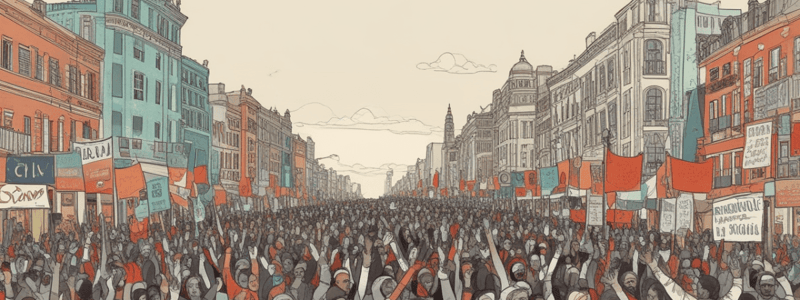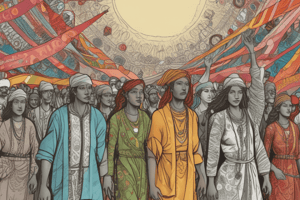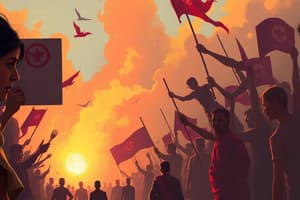Podcast
Questions and Answers
What is the main idea of the rational choice theory?
What is the main idea of the rational choice theory?
- People act based on instincts
- People act based on social norms
- People act based on emotions
- People compare pros and cons of different courses of action and choose the one that benefits themselves (correct)
What is an assumption of the rational choice theory?
What is an assumption of the rational choice theory?
- That people always make rational decisions
- That people are always motivated by self-interest
- That people never change their preferences
- That people have full knowledge of the outcomes of their actions (correct)
What can social movements cause?
What can social movements cause?
- Only individual behavior
- Always positive outcomes
- Only rational decisions
- Collective behavior like panics and crazes (correct)
What happens to a social movement that is successful?
What happens to a social movement that is successful?
What is true about social movements?
What is true about social movements?
What is an example of a social movement that was successful?
What is an example of a social movement that was successful?
What is the incipient stage of a social movement?
What is the incipient stage of a social movement?
What can be said about social movements that have failed?
What can be said about social movements that have failed?
What is true about the social movement started by Martin Luther?
What is true about the social movement started by Martin Luther?
What can be said about social movements in general?
What can be said about social movements in general?
What is a key characteristic of a social movement's leader according to the content?
What is a key characteristic of a social movement's leader according to the content?
What is a limitation of the rational choice theory?
What is a limitation of the rational choice theory?
What is a result of a successful social movement?
What is a result of a successful social movement?
What is a characteristic of social movements that have failed?
What is a characteristic of social movements that have failed?
What is true about social movements in general?
What is true about social movements in general?
What is the primary difference between a social movement's goals and the rational choice theory's assumption about individual behavior?
What is the primary difference between a social movement's goals and the rational choice theory's assumption about individual behavior?
What is the implication of a social movement becoming part of the bureaucracy it was trying to change?
What is the implication of a social movement becoming part of the bureaucracy it was trying to change?
What can be inferred about the relationship between social movements and cultural and societal formation?
What can be inferred about the relationship between social movements and cultural and societal formation?
What is the significance of the incipient stage of a social movement?
What is the significance of the incipient stage of a social movement?
What is the primary difference between a social movement and a craze?
What is the primary difference between a social movement and a craze?
Flashcards are hidden until you start studying
Study Notes
Social Movements
- A social movement is a group of people who come together to share a common idea and create lasting effects on their society by encouraging change or resisting it.
- Social movements require organization, leadership, and resources to gain momentum and make an impact.
Types of Social Movements
- Activist movements focus on changing some aspect of society.
- Regressive or reactionary movements actively try to resist change.
Formation of Social Movements
- A social movement forms when a group with a strong, shared idea has the resources and leadership to survive and make a difference.
- Theories of social movement formation include mass society theory, relative deprivation theory, resource mobilization theory, and rational choice theory.
Mass Society Theory
- Early in the study of social movements, people were skeptical of the motivations of those involved, seeing them as dysfunctional, irrational, and dangerous.
- This theory was prominent during the 20th century, but did not persist through the century.
Relative Deprivation Theory
- This theory focuses on the actions of groups who are oppressed or deprived of rights that others enjoy.
- The civil rights movement is an example of a response to inequality and oppression experienced by people of color in the U.S.
- Relative deprivation is not just about being deprived, but about feeling like one deserves better and cannot achieve it through conventional means.
- Criticisms of this theory include that it doesn't account for people who join social movements without feeling deprived, and that it's not always the most oppressed people who join.
Resource Mobilization Theory
- This theory focuses on the factors that help or hinder a social movement, such as access to resources like money, materials, and political influence.
- A social movement needs a strong organizational base to recruit members and unite them on a single idea, and a charismatic leader to focus the thoughts of members and the oppressed on the objective.
Rational Choice Theory
- This theory proposes that people compare the pros and cons of different courses of action and choose the one that is best for themselves.
- Criticisms of this theory include that it assumes all actions can be listed in order of preference, and that all preferences are transient, which is rarely the case.
Impact of Social Movements
- Social movements can affect people not actively involved in them, and can cause collective behavior like panics and crazes.
- The anti-vaccine movement is an example of a social movement that has created a panic resulting in outbreaks of diseases.
Life Cycle of Social Movements
- Social movements begin with a few ideas shared by a few, then move to the incipient stage where the public begins to take notice of a problem.
- The movement then organizes and coalesces into an organized group, raising awareness and creating change.
- A social movement's greatest achievement is to either succeed in changing its host society or adapt to failure.
- Successful social movements eventually become part of the bureaucracy they were trying to change, while failed social movements leave a mark on their society.
Examples of Social Movements
- The social movement Martin Luther began against the Catholic church resulted in Protestantism.
- The civil rights movement led by Martin Luther King Jr. resulted in the achievement of civil rights for people of color in the U.S.
- Even failed social movements like Nazism leave a lasting mark on world politics.
Social Movements
- A social movement is a group of people who come together to share a common idea and create lasting effects on their society by encouraging change or resisting it.
- Social movements require organization, leadership, and resources to gain momentum and make an impact.
Types of Social Movements
- Activist movements focus on changing some aspect of society.
- Regressive or reactionary movements actively try to resist change.
Formation of Social Movements
- A social movement forms when a group with a strong, shared idea has the resources and leadership to survive and make a difference.
- Theories of social movement formation include mass society theory, relative deprivation theory, resource mobilization theory, and rational choice theory.
Mass Society Theory
- Early in the study of social movements, people were skeptical of the motivations of those involved, seeing them as dysfunctional, irrational, and dangerous.
- This theory was prominent during the 20th century, but did not persist through the century.
Relative Deprivation Theory
- This theory focuses on the actions of groups who are oppressed or deprived of rights that others enjoy.
- The civil rights movement is an example of a response to inequality and oppression experienced by people of color in the U.S.
- Relative deprivation is not just about being deprived, but about feeling like one deserves better and cannot achieve it through conventional means.
- Criticisms of this theory include that it doesn't account for people who join social movements without feeling deprived, and that it's not always the most oppressed people who join.
Resource Mobilization Theory
- This theory focuses on the factors that help or hinder a social movement, such as access to resources like money, materials, and political influence.
- A social movement needs a strong organizational base to recruit members and unite them on a single idea, and a charismatic leader to focus the thoughts of members and the oppressed on the objective.
Rational Choice Theory
- This theory proposes that people compare the pros and cons of different courses of action and choose the one that is best for themselves.
- Criticisms of this theory include that it assumes all actions can be listed in order of preference, and that all preferences are transient, which is rarely the case.
Impact of Social Movements
- Social movements can affect people not actively involved in them, and can cause collective behavior like panics and crazes.
- The anti-vaccine movement is an example of a social movement that has created a panic resulting in outbreaks of diseases.
Life Cycle of Social Movements
- Social movements begin with a few ideas shared by a few, then move to the incipient stage where the public begins to take notice of a problem.
- The movement then organizes and coalesces into an organized group, raising awareness and creating change.
- A social movement's greatest achievement is to either succeed in changing its host society or adapt to failure.
- Successful social movements eventually become part of the bureaucracy they were trying to change, while failed social movements leave a mark on their society.
Examples of Social Movements
- The social movement Martin Luther began against the Catholic church resulted in Protestantism.
- The civil rights movement led by Martin Luther King Jr. resulted in the achievement of civil rights for people of color in the U.S.
- Even failed social movements like Nazism leave a lasting mark on world politics.
Social Movements
- A social movement is a group of people who come together to share a common idea and create lasting effects on their society by encouraging change or resisting it.
- Social movements require organization, leadership, and resources to gain momentum and make an impact.
Types of Social Movements
- Activist movements focus on changing some aspect of society.
- Regressive or reactionary movements actively try to resist change.
Formation of Social Movements
- A social movement forms when a group with a strong, shared idea has the resources and leadership to survive and make a difference.
- Theories of social movement formation include mass society theory, relative deprivation theory, resource mobilization theory, and rational choice theory.
Mass Society Theory
- Early in the study of social movements, people were skeptical of the motivations of those involved, seeing them as dysfunctional, irrational, and dangerous.
- This theory was prominent during the 20th century, but did not persist through the century.
Relative Deprivation Theory
- This theory focuses on the actions of groups who are oppressed or deprived of rights that others enjoy.
- The civil rights movement is an example of a response to inequality and oppression experienced by people of color in the U.S.
- Relative deprivation is not just about being deprived, but about feeling like one deserves better and cannot achieve it through conventional means.
- Criticisms of this theory include that it doesn't account for people who join social movements without feeling deprived, and that it's not always the most oppressed people who join.
Resource Mobilization Theory
- This theory focuses on the factors that help or hinder a social movement, such as access to resources like money, materials, and political influence.
- A social movement needs a strong organizational base to recruit members and unite them on a single idea, and a charismatic leader to focus the thoughts of members and the oppressed on the objective.
Rational Choice Theory
- This theory proposes that people compare the pros and cons of different courses of action and choose the one that is best for themselves.
- Criticisms of this theory include that it assumes all actions can be listed in order of preference, and that all preferences are transient, which is rarely the case.
Impact of Social Movements
- Social movements can affect people not actively involved in them, and can cause collective behavior like panics and crazes.
- The anti-vaccine movement is an example of a social movement that has created a panic resulting in outbreaks of diseases.
Life Cycle of Social Movements
- Social movements begin with a few ideas shared by a few, then move to the incipient stage where the public begins to take notice of a problem.
- The movement then organizes and coalesces into an organized group, raising awareness and creating change.
- A social movement's greatest achievement is to either succeed in changing its host society or adapt to failure.
- Successful social movements eventually become part of the bureaucracy they were trying to change, while failed social movements leave a mark on their society.
Examples of Social Movements
- The social movement Martin Luther began against the Catholic church resulted in Protestantism.
- The civil rights movement led by Martin Luther King Jr. resulted in the achievement of civil rights for people of color in the U.S.
- Even failed social movements like Nazism leave a lasting mark on world politics.
Studying That Suits You
Use AI to generate personalized quizzes and flashcards to suit your learning preferences.



